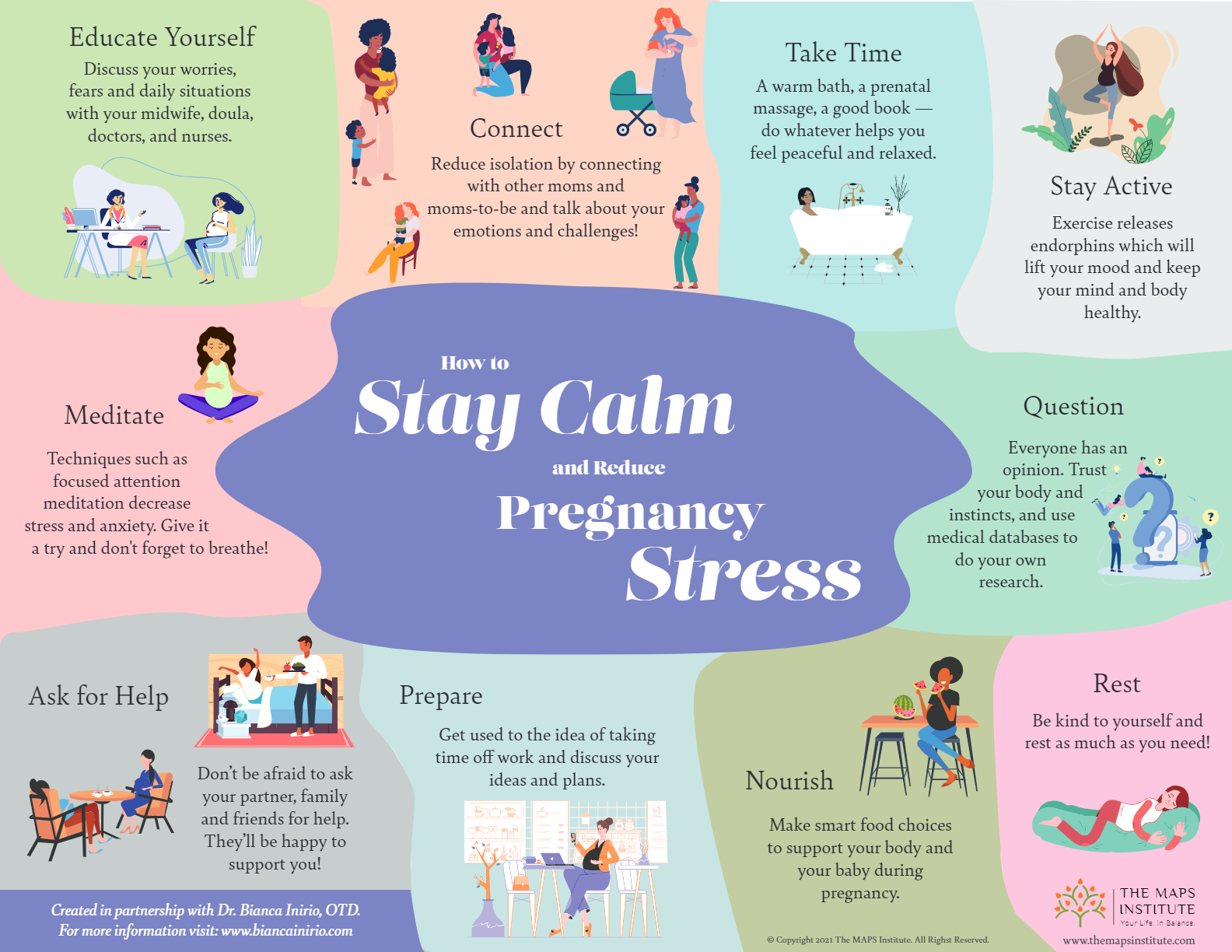What Research is Revealing About Stress During Pregnancy and 10 Ways to Keep Your Brain and Body Calm by Dr. Bianca Inirio, OTD.

Relax and take it easy.” “Don’t get stressed out. It’s not good for your baby.”If you’re pregnant, you’ve probably heard these well-meaning comments from family and friends. And, there’s a good chance, you’ve just as quickly dismissed it because, let’s face it, pregnancy can be a stressful process with lots to do in an already busy life.It turns out, however, that all those well-wishers may have a point.
What Research is Teaching Us About Stress During Pregnancy
Evidence-based research shows that stress in pregnancy might have an effect on the health and development of the newborn.Interestingly, researchers have found that everyday problems (Vingerhoets et al., 1989) affect health more rapidly than major life events (DeLongis et al., 1982; McEwen & Seeman, 1999). A study by Huizink et al. (2003) shows that daily hassles were associated with an average decline of 8 points in mental and psychomotor developmental scores of infants 8 months after birth.Valsamakis et al. (2019) talk about acute stress compared to chronic stress. Acute stress describes a stressor applied over a few hours, which can turn into subacute stress (repeated stress over several days) or even up to chronic stress (stress persists for weeks or months) (Valsamakis et al., 2019). The authors found that acute stress impairs reproduction if it occurs at a critical time during the precise time-course of endocrine events that induce estrus and ovulation and that chronic stress impairs reproduction in general.But what is stress actually?Literature describes stress as a physiological adaptive mechanism developed through evolution as a physiological response to stressors (Valsamakis et al., 2019). The reaction to these stressors depends on genetic factors, personality characteristics, previous experience, support from the social environment, and developed methods of coping with stress (Valsamakis et al., 2019).
The Stress of Pregnancy
While stress is an everyday occurrence, pregnant women often suffer from increased stress due to the rapid number of emotional, physiological, and environmental changes that occur as a result. This stress during pregnancy often leads to anxiety which disturbs fetal glucocorticoid environment (Valsamakis et al., 2019).Glucocorticoid is known as a hormone that affects the metabolism of carbohydrates, fats, and proteins (Valsamakis et al., 2019). This hormone plays a fundamental role in pregnancy and effects decidualization, implantation, placental development, fetal brain development, and lung maturation (Valsamakis et al., 2019).Therefore, the exposure of stress can lead to a chance of delivering a low-birth-weight baby or can temporarily unmask subclinical diseases in the mother (Williams, 2003).
How to Stay Calm and Reduce Stress During Pregnancy
The evidence, therefore, is clear — reducing stress is one of the more important things you can do to protect the health of your baby. But that can be easier said than done.
To help, I’ve compiled a list of ten simple techniques you can apply to stay calm and reduce pregnancy stress:
- Educate yourself. Talk about your worries, fears and daily life situations with your medical support team including midwifes, doulas, doctors, nurses, and other professionals. Talking about emotions and physical changes may help you to feel more comfortable about the effects of pregnancy and physical transitions.
- Connect with other pregnant women and moms. Connect with other moms or moms-to-be (e.g., via social media groups) to decrease feelings of isolation. Check-ups during pregnancy might reveal abnormalities and it really helps to talk about the findings with people who are going through or have gone through similar emotions and challenges.
- Take time for yourself: Treat yourself! Take a warm bath, book a prenatal massage, or read a book! Do whatever helps you to feel peaceful and relaxed.
- Stay active: As mentioned in my first article The Truth about Your Prenatal Workout and Why It’s Essential to Get It Right, try to stay active. Exercise releases endorphins that will lift your mood. Check out the article to find out more about the right exercise for you.
- Question opinions: I can’t say this often enough, but you will find that everybody around you has an opinion about what is right or wrong for you. My biggest advice is to trust your body and your instincts! Do your own research on medical treatments, birth interventions, and so on using Google scholar or other medical databases such as PubMed. Don’t accept statements such as: “I heard that” or “That’s just how it is”!
- Rest when you need it: Your body is running a marathon! Be kind to yourself and allow yourself to rest as much as needed!
- Nourish your body and your baby: Make smart food choices to support your body and your baby during pregnancy. Find more information on nutrition here (U.S. Department of Health and Human Services, 2021).
- Prepare yourself for maternity leave: Letting go of habits and daily routines can be challenging. Allow yourself to get used to the idea of taking some time off from work. Talk to your employer about your options to take maternity leave and discuss your ideas and plans.
- Ask your partner, family and friends for help: There will be a point in your pregnancy where you might not be able to do daily tasks by yourself anymore — and that’s ok. Don’t be afraid to ask for help. Your partner, family and friends will be happy to support you!
- Meditate: Evidence-based research shows that meditation techniques such as mindfulness-based meditation decrease stress and anxiety (Saeed et al., 2019). Give it a try and don’t forget to breathe!
The most important thing is to use and do what works for you. But whatever helps you stay calm and reduce stress during your pregnancy will be a win for both you and your baby.